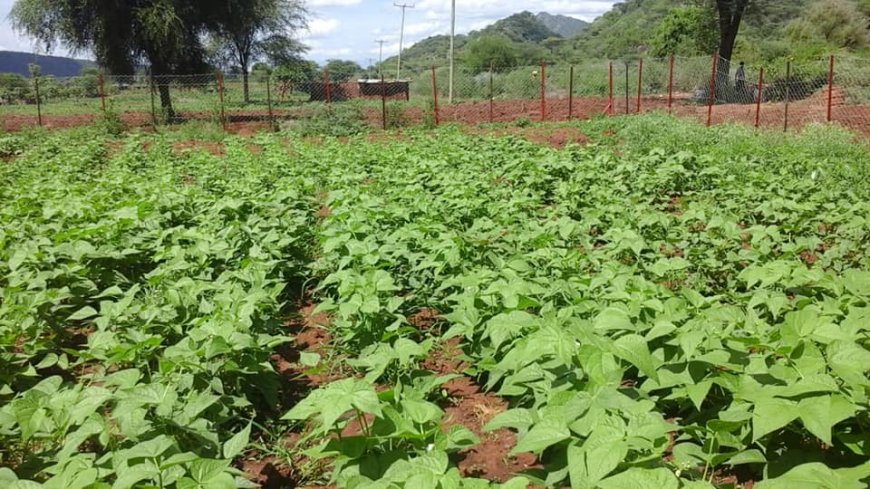Elgeyo Marakwet Smallholder Farmers Tackle Climate Change Challenges

Kapsowar,
Monday, September 18, 2023
KNA by Rennish Okong’o
Smallholder farmers in Elgeyo Marakwet County, Kenya, are turning to soil science to combat the adverse effects of climate change as they grapple with a rapidly growing population and the increasing demand for food.
For years, these farmers struggled with extreme weather conditions and unsustainable farming practices, resulting in land degradation and poor harvests. However, a shift towards soil protection and rehabilitation practices has started to yield promising results.
In the past six years, Faith Kibor, a smallholder farmer in Elgeyo Marakwet County, has witnessed a remarkable improvement in her harvests. This transformation came about as she adopted a combination of science-backed regenerative agricultural practices.
"Some of the practices I have embraced over time include increasing crop diversity to boost soil health," said Faith.
Her three-acre farm now boasts a variety of crops, including sweet potatoes, fruits, grains, and vegetables which are thriving despite unpredictable weather conditions.
For Faith, these recent years of bountiful harvests represent a stark contrast to her earlier struggles, primarily attributed to consecutive maize and Irish potato mono-cropping disasters.
"Like most smallholder farmers across Kenya, I suffered due to a lack of knowledge and information and almost gave up on farming because of soil degradation, weeds, pests, and the unpredictable impacts of climate change," she explained.
However, a significant turning point for Faith and many others came when they started implementing crop rotation to take advantage of seasonal changes and mixed cropping to rejuvenate degraded soils after harvesting corn crops.
Faith's story reflects a broader trend among smallholder farmers in Elgeyo Marakwet County who are benefitting from the expertise of agricultural extension officers and various soil science and research programs.
Faith also began growing cover crops to enhance soil fertility and suppress weed growth. This practice has not only prevented soil erosion but also regulated soil moisture and helped control pests. These initiatives have collectively contributed to her increased yields and improved farm sustainability.
To address the challenge of retaining soil moisture over extended periods and enhancing soil health in the face of climate change-induced erratic rainfall, smallholder farmers in the region have widely adopted integrated soil fertility management and improved agronomic practices.
Daniel Kosgei, an agricultural extension officer based in Marakwet West Sub County, emphasized that more smallholder farmers are abandoning detrimental farming practices that degrade their land in favor of sustainable soil management techniques.
He credited the efforts of nonprofit organizations and initiatives by state organizations like the Kenya Agricultural Research Institute (KARI) for this shift.
Kosgei underscored the crucial role healthy agricultural soils play in mitigating climate change effects, highlighting that soils are the second-largest carbon storage. He stressed the global responsibility to conserve and maintain soil health.
Elgeyo Marakwet's smallholder farmers have also embraced various soil management practices, including conservation agriculture, integrated soil fertility management, soil erosion control, and improving soil structure and water-holding capacity.
Additionally, some have adopted circular and regenerative agricultural practices by setting up soil and water conservation structures to combat erosion and water pollution due to siltation.
The significance of healthy soils cannot be overstated, as multiple studies, including a recent report by the UN's Food and Agricultural Organization (FAO), have demonstrated their critical role in addressing issues such as food insecurity and climate change.
Gabriel Ruto, another smallholder farmer in the region, invested almost two years in practicing intercropping and planting cover crops on his previously degraded two-acre farm. With limited irrigation to complement these efforts, Ruto has not experienced crop failure in the last two years, even in the face of irregular weather patterns.
"I have never missed a harvest since embracing quick-maturing crops and practices like mixed cropping. Despite complaints from some farmers, my farming has remained productive whether it rains or not ," said Ruto, a testament to the effectiveness of these sustainable farming techniques.
Despite the progress made in building the adaptive capacity of smallholder farmers, key agencies and food security experts believe that more must be done. It is widely acknowledged that detailed information, data, policies, and action plans related to soil biodiversity and health at local and national levels are needed to guide smallholder farmers.
According to a recent media release by the UN's Food and Agricultural Organization (FAO), the adoption of sustainable soil management practices by farmers remains low due to the lack of technical support, incentives, and enabling environments. FAO emphasizes the need to scale up efforts to encourage farmers to prioritize soil health and biodiversity.
Nguyo Kanegeni, a researcher at KARI, stressed the importance of encouraging more smallholder farmers in rural communities to embrace soil science and receive continuous support to boost food productivity and adapt to climate change.
He also emphasized the need for farmers living near rivers or other water bodies to promote agro-forestry systems to increase tree cover and ensure soil health remains optimal.
Elgeyo Marakwet County's journey towards sustainable and climate-resilient agriculture through soil science is well underway.
With the combined efforts of farmers, agricultural extension officers, research institutions, and government initiatives, the region is taking steps toward securing its food supply and combating the effects of climate change.
As these efforts continue to bear fruit, the hope is that more smallholder farmers across Kenya will follow suit, ushering in a new era of agricultural resilience and productivity.
Courtesy; KNA
What's Your Reaction?



































































































































































































































































































